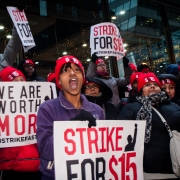Seattle Proves That “Fight for Fifteen” Movement Will Have Negative Consequences
The city of Seattle Washington is quickly becoming a cautionary tale when it comes to its economy. In May, the city even announced that it would begin levying a new employment tax on prosperous Seattle-based businesses. The “employment tax” as it is being called, will institute a new tax on the top 20 percent of businesses for each hour worked by each Seattle-based employee.
While this is absolutely absurd to tax job creators for creating value for Seattle, what is seemingly more absurd is the fact that the city hasn’t seemed to learn anything from its previous attempts to centrally plan its economy.
Fight for Fifteen
In many ways, Seattle is personally responsible for sparking the “fight for fifteen” movement. In 2014, it became the first municipality to vote in favor of raising the minimum wage to $15.00 an hour. At the time, the city’s minimum wage was only $9.47.
Jumping from less than ten dollars all the way to $15 was a dramatic increase. Even the city recognized the danger this posed on local businesses, who would be the ones responsible for finding the means to fund the new wage rate. So, it was decided that instead of the new minimum wage going into effect at the beginning of 2015, the city would do it incrementally.
After the first year, when the minimum wage had been increased from $9.47 to $11.00, a research team at the University of Washington began analyzing the effects it had on employment, specifically in the restaurant industry. As it turned out, the impact was minimal. For most people, the wage increase resulted in an extra 72 cents every few months. But what was most shocking to these researchers was the fact that low-wage employees, the very people who this was wage increase was supposed to help, were being negatively impacted. Low-wage employment was actually down in the year following the increase. But at the time the study was conducted, there simply wasn’t enough data to confirm how big of an impact the new wage rate was having. The city was going to have to wait a little longer before they could determine the impact.
Then, last summer, UC Berkeley joined in on the research and released their own new numbers declaring:
“Our results show that wages in food services did increase — indicating the policy achieved its goal. … Employment in food service, however, was not affected, even among the limited-service restaurants, many of them franchisees, for whom the policy was most binding.”
Of course, this gave city officials all the fuel the needed to start boasting that their initiative had been a success. However, right after then-Mayor Ed Murray has published the Berkeley findings on his own government page, bragging that wages in the fast food industry specifically had increased without negatively impacting employment rates, the University of Washington released its second installment of the study. And this one did not fit the city’s narrative.
Centrally Planned Economies Do Not Work
When the new study from University of Washington was released, Bloomberg reported:
“The University of Washington released its second study, this one covering the increase from $11 an hour to $13. And this study found huge effects: For every 1 percent increase in their hourly wage, low-wage workers saw a 3 percent reduction in the number of hours worked. As a result, they lost about $125 in earnings a month, clawing back the entire gain from the earlier hike and more.”
As it turns out, money has to come from somewhere. And when employers are forced to pay more money to meet the wage requirements they have to cut hours or even cut positions in order to afford to do so.
Of course, the mayor couldn’t be troubled with these new inconvenient findings and stayed relatively quiet.
As new studies are about to be released, we are about to find out just how grave the numbers look after the wage has incrementally increased once again, quickly approaching $15.00 per hour.
But the data already provided does not do much to boost hope. And instead of trying to meddle in the market further like they are doing with the new employment tax, Seattle officials should seriously be considering the consequences of their actions.
While taxation and the minimum wage rate are not entirely the same, they both require the central planning of an entire economy, of which no good can come. A governing body that tries to control an entire economy will soon find they do not have enough knowledge or insight to do so. As Hayek reminds us, “The curious task of economics is to demonstrate to men how little they really know about what they imagine they can design.” And when it comes to determining employee wages, the market will always do a better job than government.




